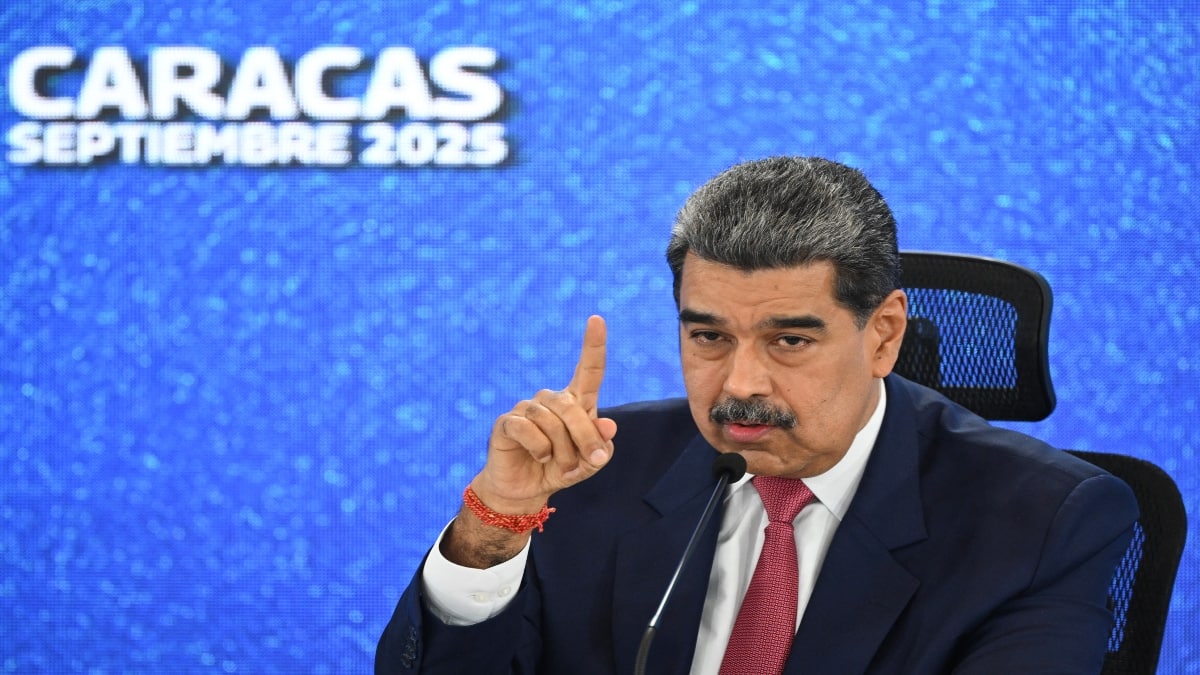World
Venezuela’s Maduro Accuses US of War Fabrication as USS Ford Deploys

Venezuelan President Nicolás Maduro has publicly accused the United States of “fabricating a new war” following the deployment of its largest aircraft carrier, the USS Gerald R. Ford, to the Caribbean. This move represents a significant escalation in US military presence in a region already fraught with tension.
The USS Gerald R. Ford, capable of carrying up to 90 aircraft, enhances US firepower in the Caribbean. The Pentagon confirmed that the carrier will operate within the Southern Command area, which covers Central and South America as well as the Caribbean. According to Pentagon spokesperson Sean Parnell, this deployment is intended to “enhance and augment existing capabilities to disrupt narcotics trafficking and degrade and dismantle transnational criminal organizations.”
In the face of these developments, President Donald Trump has labeled Maduro as the leader of a drug-trafficking organization, a serious allegation that Maduro vehemently denies. Many Venezuelans express concern that the increased military presence signals an intention to remove Maduro from power. The US government, along with several other nations, does not recognize Maduro as Venezuela’s legitimate leader following the 2024 election, which was widely criticized for being unfair. Opposition groups reported a landslide victory for their candidate.
The US military’s actions include a reported ten airstrikes on vessels in the Caribbean, actions the Trump administration claims are part of a broader campaign against drug trafficking. Despite these claims, experts note that Venezuela plays only a minor role in the overall drug trade in the region.
Maduro responded to the US actions, stating, “They promised they would never again get involved in a war, and they are fabricating a war,” suggesting that the US is seeking to create “a new eternal war.” He emphasized the potential for the carrier to enable ground strikes, raising tensions further.
Trump has hinted at possible ground actions in Venezuela, stating earlier this week, “We stopped all drugs from coming in by sea. I will stop all drugs from coming in by land very shortly. You’ll see that starting.” Moreover, the US has bolstered its air presence, with military aircraft sighted over Puerto Rico.
While reports indicate that Trump is contemplating strikes on cocaine facilities and trafficking routes in Venezuela, no definitive decision has been made as of yet. Analysts observe that intercepting drugs at sea does not necessitate such a large military deployment, suggesting that the current situation may be more about posturing than direct action.
As tensions escalate, the implications of this military buildup could have far-reaching effects on US-Venezuela relations and the stability of the Caribbean region. The world watches closely as this situation continues to unfold.
-

 World3 months ago
World3 months agoSBI Announces QIP Floor Price at ₹811.05 Per Share
-

 Lifestyle3 months ago
Lifestyle3 months agoCept Unveils ₹3.1 Crore Urban Mobility Plan for Sustainable Growth
-

 Science3 months ago
Science3 months agoNew Blood Group Discovered in South Indian Woman at Rotary Centre
-

 Sports3 months ago
Sports3 months agoBroad Advocates for Bowling Change Ahead of Final Test Against India
-

 World3 months ago
World3 months agoTorrential Rains Cause Flash Flooding in New York and New Jersey
-

 Top Stories3 months ago
Top Stories3 months agoKonkani Cultural Organisation to Host Pearl Jubilee in Abu Dhabi
-

 Science3 months ago
Science3 months agoNothing Headphone 1 Review: A Bold Contender in Audio Design
-

 Top Stories3 months ago
Top Stories3 months agoAir India Crash Investigation Highlights Boeing Fuel Switch Concerns
-

 Sports3 months ago
Sports3 months agoCristian Totti Retires at 19: Pressure of Fame Takes Toll
-

 Business3 months ago
Business3 months agoIndian Stock Market Rebounds: Sensex and Nifty Rise After Four-Day Decline
-

 Politics3 months ago
Politics3 months agoAbandoned Doberman Finds New Home After Journey to Prague
-

 Top Stories3 months ago
Top Stories3 months agoPatna Bank Manager Abhishek Varun Found Dead in Well









